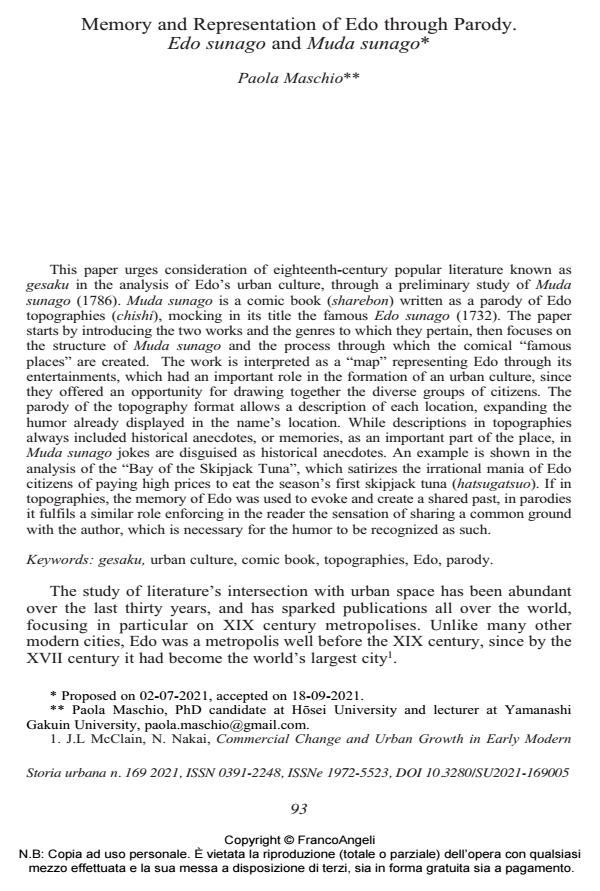Memory and Representation of Edo through Parody. Edo sunago and Muda sunago
Journal title STORIA URBANA
Author/s Paola Maschio
Publishing Year 2022 Issue 2021/169
Language English Pages 12 P. 93-104 File size 160 KB
DOI 10.3280/SU2021-169004
DOI is like a bar code for intellectual property: to have more infomation
click here
Below, you can see the article first page
If you want to buy this article in PDF format, you can do it, following the instructions to buy download credits

FrancoAngeli is member of Publishers International Linking Association, Inc (PILA), a not-for-profit association which run the CrossRef service enabling links to and from online scholarly content.
This paper urges consideration of eighteenth-century popular literature known as gesaku in the analysis of Edo’s urban culture, through a preliminary study of Muda sunago (1786). Muda sunago is a comic book (sharebon) written as a parody of Edo topographies (chishi), mocking in its title the famous Edo sunago (1732). The paper starts by introducing the two works and the genres to which they pertain, then focuses on the structure of Muda sunago and the process through which the comical "famous places" are created. The work is interpreted as a "map" representing Edo through its entertainments, which had an important role in the formation of an urban culture, since they offered an opportunity for drawing together the diverse groups of citizens. The parody of the topography format allows a description of each location, expanding the humor already displayed in the name’s location. While descriptions in topographies always included historical anecdotes, or memories, as an important part of the place, in Muda sunago jokes are disguised as historical anecdotes. An example is shown in the analysis of the "Bay of the Skipjack Tuna", which satirizes the irrational mania of Edo citizens of paying high prices to eat the season’s first skipjack tuna (hatsugatsuo). If in topographies, the memory of Edo was used to evoke and create a shared past, in parodies it fulfils a similar role enforcing in the reader the sensation of sharing a common ground with the author, which is necessary for the humor to be recognized as such.
Keywords: gesaku, urban culture, comic book, topographies, Edo, parody.
Paola Maschio, Memory and Representation of Edo through Parody. Edo sunago and Muda sunago in "STORIA URBANA " 169/2021, pp 93-104, DOI: 10.3280/SU2021-169004